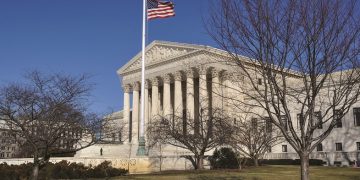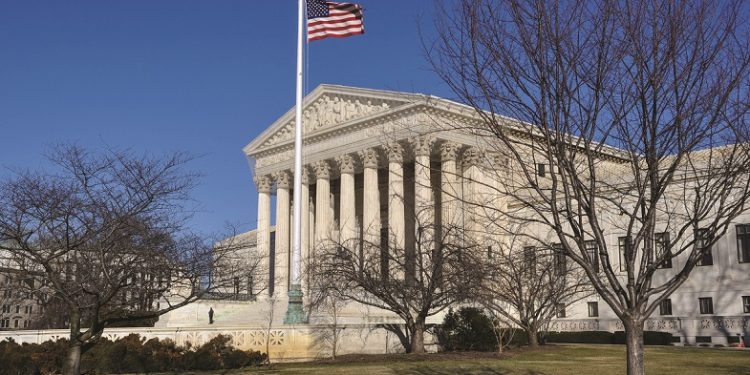On January 6, 2023, the U.S. Supreme Court could decide to take a case concerning mail-in voting in Pennsylvania, continuing the saga that began on October 31, 2019, when Gov. Tom Wolf signed into law the Republican-backed Act 77.
The case, titled “Timothy R. Bonner, et al., Petitioners v. Leigh Chapman, in Her Official Capacity as Acting Secretary of Pennsylvania, et al.,” has already been through two Pennsylvania courts, and the U.S. Supreme Court has been asked to consider reviewing the case on the grounds of whether the mail-in voting portion of Act 77 violates the U.S. Constitution. If the Supreme Court determines that the act is unconstitutional, that would invalidate no-excuse mail-in voting in the state. Gregory Teufel, the attorney representing the petitioners, told The Lancaster Patriot that he is hopeful the case will be heard.
The issue is an important one, Teufel declared. “It’s one that could have far-reaching effect, because there are mail-in voting laws that violate the U.S. Constitution in the same way as Pennsylvania’s does across the country.”
The problem with these mail-in voting laws, Teufel said, is that they fail to specify a place for someone to vote when they vote by mail, which violates Article 1, Section 4 of the U.S. Constitution. The election clause in that section states, “The Times, Places and Manner of holding Elections for Senators and Representatives, shall be prescribed in each State by the Legislature thereof.”
Teufel said that this clause mandates that states must specify places where federal elections are held. Because the mail-in voting law in Pennsylvania does not specify a place, it essentially allows a voter to vote from anywhere in the world. By requiring a set location, the law allows people to observe the voting process and, he said, “verify that there is nothing being done incorrectly, no corruption, no bribery, no intimidation, et cetera, happening.”
“We believe that Article 1, Section 4 serves an important functional purpose in requiring states to specify places of elections,” Teufel said, “because once there are places specified for elections, that introduces an element of accountability to elections by giving you a place you can go to watch the election happening and make sure nothing is being done incorrectly and that the law is being followed.”
The voting process in Pennsylvania was drastically changed through the passage of Act 77, which allowed voters to vote by mail up to 50 days before an election and allowed no-excuse mail-in voting. A year ahead of the 2020 election, Act 77 passed the state House 138-61 and the state Senate 35-14. Reps. Dave Zimmerman (R-99) and Steven Mentzer (R-97) were among those who voted against the bill.
When Act 77 was passed, Sen. Lisa Boscola (D-18), the bill’s prime sponsor, heralded it as a bill that modernized antiquated voting laws. “Now a voter’s kitchen table can become their voting booth, and researching candidates can be done in real time,” she said.
In August 2021, 14 Republican state House members filed a lawsuit that asked the Pennsylvania courts to invalidate mail-in voting by declaring it unconstitutional. Members of the lawsuit included Zimmerman, Mike Jones (R-93), Tim Twardzik (R-123) and Timothy Bonner (R-17). Of the 14 GOP legislators involved in the lawsuit, 11 had voted for Act 77, while Bonner and Twardzik were not in office at the time and Zimmerman had voted against it. Even though the lawsuit is being pursued by Pennsylvania state representatives, the case is being funded privately and not through taxpayer monies.
The lawsuit argued that the Pennsylvania Constitution restricts absentee voting to exceptions that are explicitly named in the state constitution.

In January 2022, the Commonwealth Court ruled in favor of the petitioners’ lawsuit. That ruling invalidated mail-in voting and Act 77, saying that the Pennsylvania Constitution forbids widespread mail-in voting. Because the decision voided the no-excuse mail-in voting based on the state constitution, the court did not address the question in regards to the U.S. Constitution.
Then, on August 2, 2022, the Pennsylvania Supreme Court overturned the Commonwealth Court’s decision, determining that no-excuse mail-in voting does not violate the state constitution. The clause in the U.S. Constitution was not addressed. An amicus brief filed by the American Civil Liberties Union of Pennsylvania presented the argument that while the state constitution does mandate absentee voting for those explicitly listed, it does not preclude the legislature from expanding the option of voting by mail to everyone.
Teufel said, “We don’t have a decision below from either the Commonwealth Court or the Pennsylvania Supreme Court on the merits of the federal constitutional issues that we raised.”
Now the case has been submitted to the U.S. Supreme Court in the hope that it will be granted a writ of certiorari, which would mean the lower courts would be ordered to send the case to be heard by the Supreme Court. Four of the nine U.S. Supreme Court justices must agree to review the case for a writ of certiorari to be granted. Teufel said it is always an uphill battle to be granted a writ of certiorari, since the Supreme Court takes a very low percentage of cases, but he remains optimistic. “I think we have a decent chance,” he said. “We wouldn’t have filed it otherwise.”
Not all decisions regarding writs of certiorari for potential cases will be determined on January 6, but Teufel said he anticipates that the process of selecting cases will conclude by the end of January. If the court takes the case, Teufel said he would expect a decision by October 2023 at the latest.

Chris Hume is the host of The Lancaster Patriot Podcast and the author of several books, including Seven Statist Sins. He can be reached at info@thelancasterpatriot.com.






























I doubt the Court will hear this case. The impact across the entire US would call into question every vote by mail or absentee method.
Technoogy changes have made it possible for people without mobility to participate in elections. We need a more secure method and verification (I.D. and Chain of Custody Laws)
The entire system of voting depends on honesty and fair dealing. The society we have now does not share the ethical standards of the early 20th century. We were shaped by the global depression between the horrors of 2 world wars. Nothing better demonstrates those ideals than the paintings of Norman Rockwell. “The Four Freedoms” are under constant attack by Democrats, Marxists, Antifa and BLM.
The naked demads for money and power have bastardized our society. If we don’t go back to fair and ethical dealings this Republic will be overtaken by the worst dregs and descend into anarchy and potential civil war. At such time one can expect China and Ruissia to attempt a military overthrow and that Red Dawn will not end with a group of ‘Wolverines’ succeding.
I still never understand how courts become involved in very clearly defined issues, in the US Constitution, which says “The Times, Places and Manner of holding Elections for Senators and Representatives, shall be prescribed in each State by the Legislature thereof.” A court is not mentioned in the US Constitution about it’s ability to be involved in this issue. No different than Roe v Wade – it was returned to the states as SCOTUS found no standing inside the US Constitution for it to become involved. The same for the PA constitution. In January 2022, the Commonwealth Court ruled and noted that Act 77 invalidated mail-in voting saying that the Pennsylvania Constitution forbids widespread mail-in voting.
It should be noted that the PA Supreme Court is one of the most political in the nation. Five elected (every 10 years) are currently democrat, one is appointed (democrat) and one is elected (republican). It is considered by Ballotpedia as being a liberal-democrat based court. Gee seems as though the scale of law and application of such doesn’t apply with election issues in PA
If there’s a dispute such as on these grounds (“the law itself is illegal”), then who do you think should handle the case if not the court system?
I think they better take the case and do something. Otherwise, they will be out of a job like the one they have now as the nation is clearly and has for some time been on a path of destruction from within by way of the vote.
Just for fun, I should check and see if my parents voted in the 2020 and 2022 elections. They both died 10 years ago.
The U. S. constitution is very clear, and supersedes the pa constitution. If the Supreme Court is compromised then the defenders of the constitution will have to handle it.
Odd since the SCOTUS doesn’t start up again until 1/9/23.
Not likely they take this case. The US constitution says the STATES get to determine their own election rules. For them to take the case, they would have to violate state sovereignty across the whole country. It would cause chaos and endless lawsuits and litigation between both parties. It would also cause mass voter disenfranchisement. The Court would either have to be dismantled and reformed or significantly made larger if they took such a drastic measure. Its already the least credible court in American history after two stolen republican seats leading to Dobbs.
Clark, what do you think about global warming?
SCOTUS denied certiorari and will not hear this case